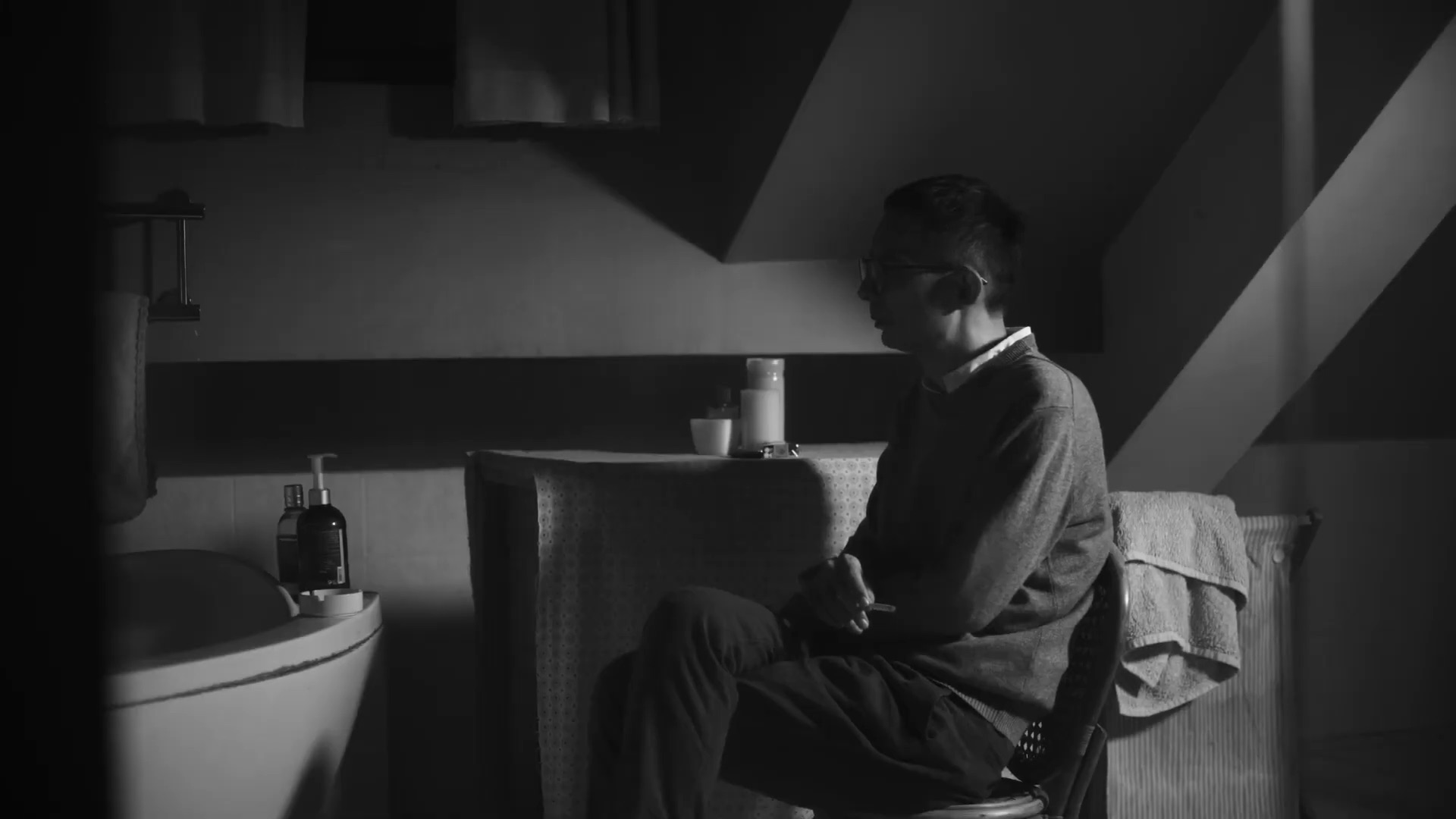Source: The China Project (9/1/23)
‘Talks Overnight’ probes intellectuals’ anxiety in COVID-era China
Writer-director Su Qiqi describes her deeply personal, black-and-white debut as a “faux-fiction” film.
By Amarsanaa Battulga

Still from ‘Talks Overnight.’
Talks Overnight, a low-budget slice-of-life Hong Kong production, recently had its international premiere as part of the Mulan International Film Festival in Toronto. The fourth edition of the not-for-profit volunteer-run festival, which aims at “facilitating appreciation of Chinese cinema,” ran between August 11 and 20.
Largely doing away with a plot, the film pieces together a middle-aged couple’s several conversations, hence the title. Its form reminds one of Liú Jiāyīn’s 刘伽茵 award-winning Oxhide (2005) in that Sū Qīqī 苏七七, who previously co-produced the arthouse hit A New Old Play, casts herself, her husband Mǎ Yuèbō 马越波, and their friends in scripted versions of themselves.
Talks Overnight declares from the outset that it’s about a very particular group of people: intellectuals. In the opening scene, a middle-aged couple — Qiqi and Bobo — sits on their living room couch and reads ancient poems, together and aloud. Their bed is surrounded by stacks of books, a symbolic barrier that sets them off from the rest of society, safely on their comfortable bed or the so-called ivory tower. But this very bed also becomes the source of anxiety for Qiqi, a film critic and university professor, as she suffers from insomnia.
At first, the reason for Qiqi’s unease is revealed to us as relating to her specific profession. When she hosts her married friends for lunch at home, they lament how publishing a contemporary criticism book doesn’t count toward tenure. Only the research project, or 课题 kètí, is deemed a purely academic endeavor, while Qiqi’s proposal recently got rejected. Nor is their knowledge readily monetizable outside academia. “It’s just unfortunate that this world, this society doesn’t require people to think conscientiously!” Qiqi’s friend says bitterly.
Accompanying this intellectual’s predicament is a certain sense of snobbishness. Qiqi is blind to her shallow perception of others, e.g., the women she casually chats with in a café, whom she calls “ordinary people,” whose lives are “still smooth and whole.” Such an attitude is perhaps partly influenced by their middle-class lifestyle. Early in the film, Bobo announces at breakfast that he’s going to the office to work that morning, indicating it’s not something he has to do often. When he arrives at his office, he smokes a cigarette while writing poems. Then he returns home for lunch where the four friends chat over a bottle of red wine paired with Chinese cuisine, while making references to the Bible.
Other conflicts begin to surface soon enough. In an argument with Bobo, Qiqi cries that her troubles as a woman “grow inside her body.” The four friends are baffled over their kids’ generation’s “rebellious and depressed” attitude. But the true underlying cause of their anxiety becomes clear, albeit subtly, only in the second half of the film. The owner of the café mentioned above briefly complains that she has fewer customers these days because of the seemingly never-ending pandemic. Bobo confesses that he’s unable to help ease Qiqi’s worries because he has “lost all the optimism and determination that [he’s] always had” in the “past two years” because of “things happening around [him] and in the whole world.” In this way, what’s not spoken explicitly turns out to be more important than what is.
“I knew I wanted to make a movie with a mixture of fiction and fact: factual on the inside, fictional on the outside,” explains Su in her director’s statement. “It comes from a real place but inevitably ventures into the surreal, fusing daily lives with poetry and theater, concepts and delusions.” These surreal elements take the form of abstract, evocative imagery interspersed throughout the conversations, such as burning forests and a rainfall in a kitchen. Moreover, street production of Franz Kafka’s The Judgment and several contemporary poems, which are Ma Yuebo’s own works, are included organically in the film. Su not only blends fiction and reality, but also crosses the boundaries of theater, film, and poetry.
The film’s cinematography, handled by first-timer Zhāng Zhēng’ān 张峥安, has no apparent style. It shifts from still camera at night scenes to pans, closeups, and shaky shots during the day as if visually conveying the uncertainty and anxiety of the times that are at the heart of the narrative.
The eventual, somewhat life-affirming, also laissez-faire conclusion of Talks Overnight seems to be that “life goes on.” In its last scenes, Qiqi and Bobo overhear a young couple at a temple who reads on a plaque beside an old tree that it has died and revived three times over the centuries. Then they get in their car and drive off on a zigzag mountain road that, while swinging to two sides, will surely take them forward.
is a Shanghai-based film critic and researcher who decided to do a PhD in comparative literature instead of going to therapy. He’s from Mongolia. He cannot ride a horse. @Amarsanaa__ Read more